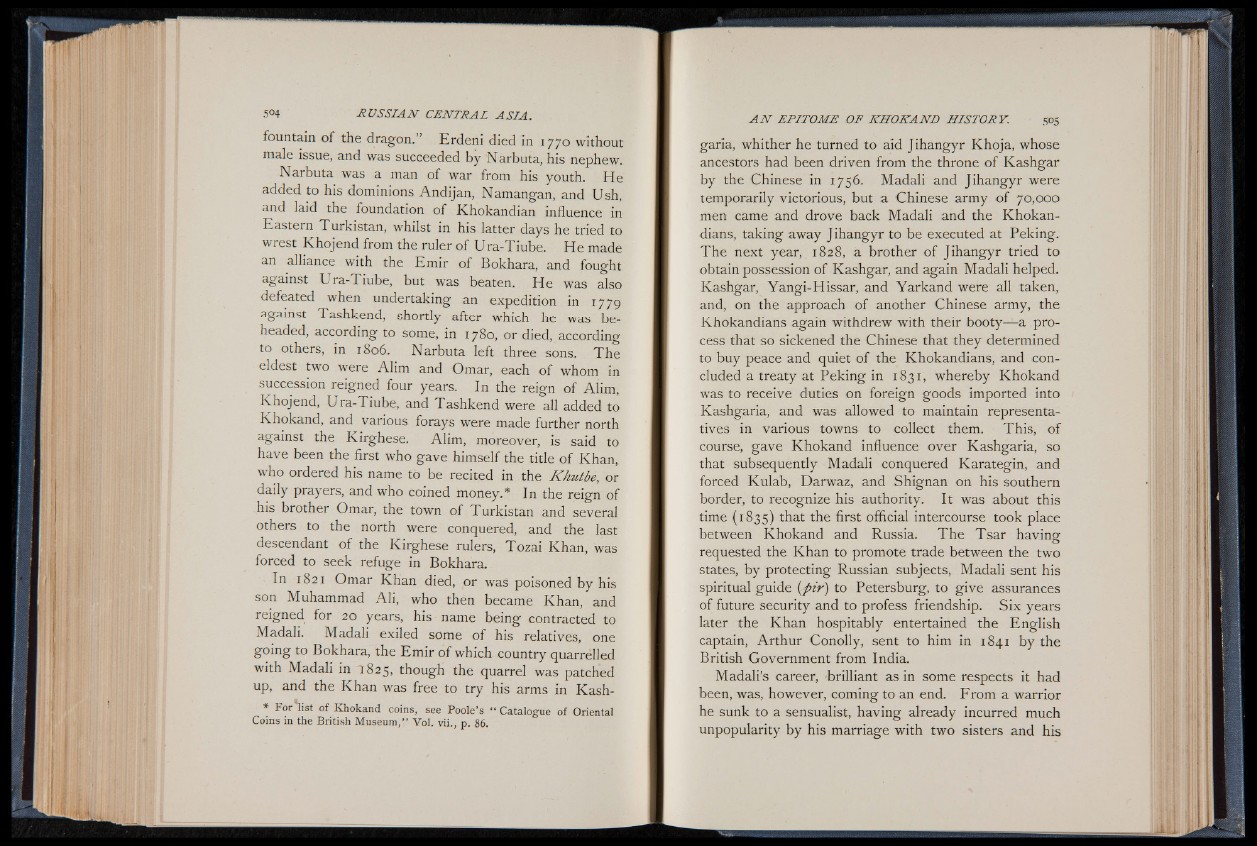
fountain of the dragon.” Erdeni died in 1770 without
male issue, and was succeeded by Narbuta, his nephew.
Narbuta was a man of war from his youth. He
added to his dominions Andijan, Namangan, and Ush,
and laid the foundation of Khokandian influence in
Eastern Turkistan, whilst in his latter days he tried to
wrest Khojend from the ruler of Ura-Tiube. He made
an alliance with the Emir of Bokhara, and fought
against Ura-Tiube, but was beaten. He was also
defeated when undertaking an expedition in 1779
against Tashkend, shortly after which he was beheaded,
according to some, in 1780, or died, according
to others, in 1806. Narbuta left three sons. The
eldest two were Alim and Omar, each o f whom in
succession reigned four years. In the reign of Alim,
Khojend, Ura-Tiube, and Tashkend were all added to
Khokand, and various forays were made further north
against the Kirghese. Alim, moreover, is said to
have been the first who gave himself the title of Khan,
who ordered his name to be recited in the Khutbe, or
daily prayers, and who coined money.* In the reign of
his brother Omar, the town of Turkistan and several
others to the north were conquered, and the last
descendant of the Kirghese rulers, Tozai Khan, was
forced to seek refuge in Bokhara.
In 1821 Omar Khan died, or was poisoned by his
son Muhammad Ali, who then became Khan, and
reigned for 20 years, his name being contracted to
Madali. Madali exiled some of his relatives, one
going to Bokhara, the Emir of which country quarrelled
with Madali in '1825, though the quarrel was patched
up, and the Khan was free to try his arms in Kash-
* For lis t o f Khokand coins, see Poole’ s ‘ ‘ Catalogue of Oriental
Coins in the British Museum,” Vol. vii., p. 86.
garia, whither he turned to aid Jihangyr Khoja, whose
ancestors had been driven from the throne of Kashgar
by the Chinese in 1756. Madali and Jihangyr were
temporarily victorious, but a Chinese army of 70,000
men came and drove back Madali and the Khokan-
dians, taking away Jihangyr to be executed at Peking.
The next year, 1828, a brother of Jihangyr tried to
obtain possession of Kashgar, and again Madali helped.
Kashgar, Yangi-Hissar, and Yarkand were all taken,
and, on the approach of another Chinese army, the
Khokandians again withdrew with their booty— a process
that so sickened the Chinese that they determined
to buy peace and quiet of the Khokandians, and concluded
a treaty at Peking in 1831, whereby Khokand
was to receive duties on foreign goods imported into
Kashgaria, and was allowed to maintain representatives
in various towns to collect them. This, of
course, gave Khokand influence over Kashgaria, so
that subsequently Madali conquered Karategin, and
forced Kulab, Darwaz, and Shignan on his southern
border, to recognize his authority. It was about this
time (1835) that the first official intercourse took place
between Khokand and Russia. The Tsar having
requested the Khan to promote trade between the two
states, by protecting Russian subjects, Madali sent his
spiritual guide (ftir) to Petersburg, to give assurances
of future security and to profess friendship. Six years
later the Khan hospitably entertained the English
captain, Arthur Conolly, sent to him in 1841 by the
British Government from India.
Madali’s career, brilliant as in some respects it had
been, was, however, coming to an end. From a warrior
he sunk to a sensualist, having already incurred much
unpopularity by his marriage with two sisters and his